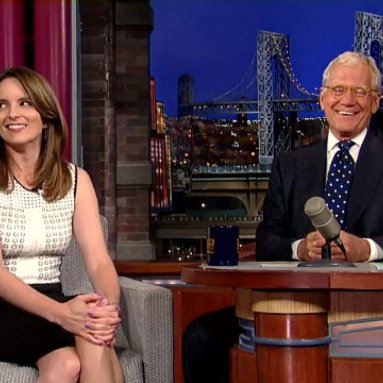Malala Yousafzai Shares Thoughts on Trump, Jay-Z on David Letterman Talk Show
In this story


In a new episode of 'My Next Guest Needs No Introduction,' the talk-show host teases out details about Yousafzai's activism and life as a college student.
After two episodes spent with former president Barack Obama and actor George Clooney, David Letterman sat down with Malala Yousafzai to discuss her activism and life as a college student in the latest episode of his Netflix talk show, which fittingly debuted on International Women's Day.
Vacillating between a live discussion with Yousafzai onstage in New York and in-the-field segments of Letterman visiting the Pakistani activist at Oxford University, the latest episode of My Next Guest Needs No Introduction found Letterman teasing out details from the 2012 attack that gave Yousafzai's activism a global stage and attempting to learn more about her ambitions after her first term in college.
The segment kicked off with Letterman tailing, and de-railing, Yousafzai while she gave a tour for prospective students of her Oxford college, Lady Margaret Hall, the first women's college at the university. "I'm from Ball State. Anyone apply to Ball State?" Letterman joked.
But back in New York, Letterman started off his discussion with Yousafzai on a more serious note. He asked where her poise in speaking came from, a question inspired by the activist's 2014 address accepting the Nobel Peace Prize, when she was 17 years old. Yousafzai responded that because she had many teachers in her family — her grandfather, father and grandfather — she learned how to deliver her message.
She added that she didn't want to accept the prize just for herself, but for the 130 million girls worldwide who are still without an education. Girls' education is Yousafzai's main cause, having been the subject of an anonymous BBC blog that caught the attention of the Taliban when she still lived in Pakistan; since fleeing the country Yousafzai has instituted a school for Syrian refugees in Lebanon and is building another in Pakistan, with plans for more worldwide.
Shifting to the 2012 attack by the Taliban that, unfortunately, made Yousafzai's name, Letterman asked what she thought the impetus for the attempt on her life was. In 2012, a group of Taliban members attacked a school bus carrying Yousafzai and other girls home, leaving Yousafzai in critical condition and two others injured and galvanizing a global outrage and support for her cause of improving girls' education.
Yousafzai speculated that the attention that accompanied her nomination for an International Children's Peace Prize that year had capped her previous work to improve girls' education. Yousafzai said that she was concerned for her father, a school teacher and supporter of women's education, but, "We were not expecting that they would target [or] try to kill a child."
"I don't remember the incident, which is good in a sense, because I don't have to look back," Yousafzai said of the shooting, which she called as real to her as a "fable." After the attack, doctors at the University Hospitals Birmingham in the U.K. removed part of her skull to remove a bullet. "I was in a different world, I did not know that hundreds of thousands of people were speaking out … all I was thinking about was going back to Pakistan," she said. Concerns for her safety, however, have prevented her from going back several times.
When asked if she felt there was "purpose" to the attack, and to her survival of it, Yousafzai paused. "I think there might be but even if there isn't, you yourself can make a decision," she said. As a result of seeing death so "close," she said that she realized that her life had a purpose, and that she would dedicate it to girls' education.
Letterman, professing having no knowledge of the Taliban, asked her where she believed their misogyny came from. Yousafzai responded that the group misinterpreted the word of Islam to back up their claims that women should no longer be able to go to school, or even to go out to markets. "But sometimes I think they are more clever than some other leaders in the world because they knew that education can impact women, and they recognized that," Yousafzai said. She added that their attitude toward women was "just that old kind of superiority complex" and that the Taliban found "excuses" for their beliefs in culture and literature.
Comic relief arrived in the form of a travel segment at Oxford, where Letterman deliberately distracted members of the tour that Yousafzai was leading, asking if they had the Harry Potter series in an academic library and questioning the group on whether they had ever had KFC while touring the dining hall. "You guys watch The Crown?" he asked as they walked under some arches. "I'm afraid not," Yousafzai responded.
At another point, Letterman pointed out how remarkable the tour guide was, though Yousafzai had previously stressed that she deflects questions about herself to keep the focus on the visitors' futures. "You know she has a Nobel Peace Prize. I have two daytime Emmys. I'm intimidated," he said.
At another point, Letterman pressed Yousafzai on her ideas for her future, asking if she had political ambitions. "Me?" she laughed, "No." After Oxford, she told him, "I want to continue my work for girls' education, that's what I have dedicated my life to, and I want to see more young girls getting a quality education, getting empowered, and becoming leaders of today and tomorrow."
Letterman also ate fish and chips with Yousafzai's father, Ziaddin. When asked what he hoped for his daughter's future, Ziaddin responded, "To be honest, we just want Malala to exist in her life, we leave her dreams to her … The first and foremost thing is her safety."
For a few short moments during the program, Letterman shifted the conversation to the state of the U.S. After Letterman mentioned Trump administration budget proposals that have slashed funding for education, Yousafzai said, "This is really tragic that this is happening, and it does worry me that these leaders, they talk about eradicating extremism and ending poverty and then they ignore education. That's the first thing you need to do, you need to give education to the future generation and allow them the opportunity to follow their dreams and then contribute to their economies and their countries."
When initially asked about Trump, Yousafzai punted, saying, "Well I'm in the U.K., so what do you think about him?" while holding up her hands. But later, after Letterman voiced his opinion that Trump was unfit to represent anyone in the auditorium, the activist chimed in. "Some of the things have really disappointed me, like sexual harassment and the ban on Muslims and racism. You see all these things and you feel that America, being known for human rights and liberty and freedom, that country should be leading on human rights," Yousafzai said.
In a lighter moment in the episode, Letterman played a game with Yousafzai, asking her to choose between two words and explain which she preferred. Yousafzai had trouble with "pizza or tacos," saying that she doesn't like either and eats pizza only when she has to because her friends like it, and "Kanye or Jay-Z," noting that she likes the "latest songs" but never looks to see who made it. When Letterman jokingly asked her whether she prefers the Yankees or the Mets, Yousafzai revealed that she has joined Oxford's cricket club.
At the end of the episode, Yousafzai asked Letterman if she could ask him a few questions, which he assented to. "Beard or no beard?" she joked.
Netflix David LettermanRead the full article – Hollywoodreporter.com
